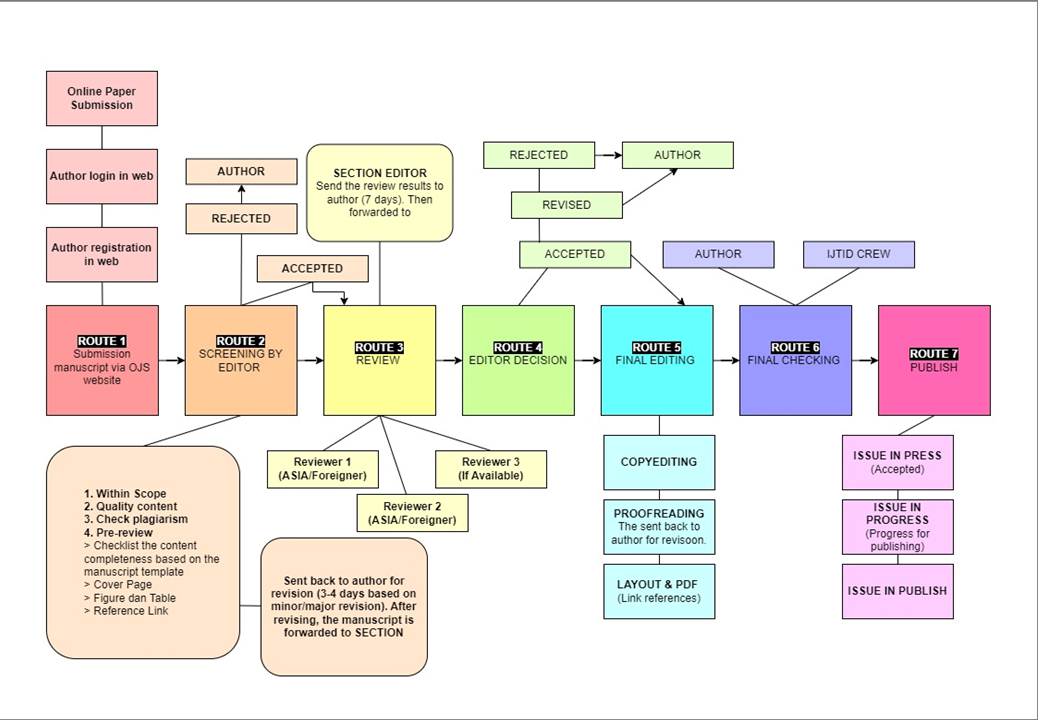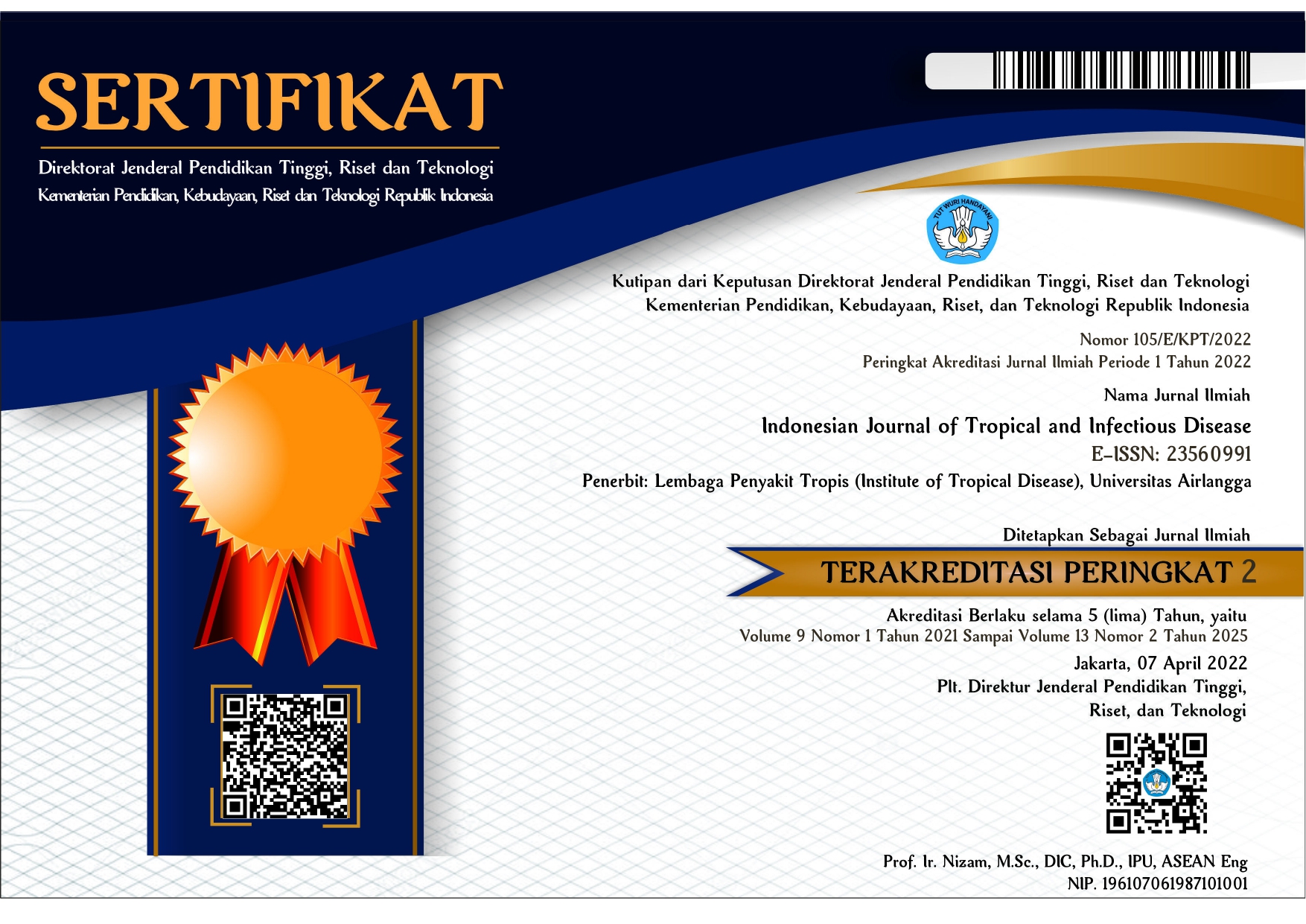Peer Review Process
All manuscripts received by INDONESIAN JOURNAL OF TROPICAL AND INFECTIOUS DISEASE (IJTID) will be peer-reviewed by at least two reviewers for each manuscript selected based on their expertise via Open Journal System (OJS) based on the originality, contribution to the field of the scientific area, coherence of the analysis, grammar, and style. This journal uses the framework of Double-Blind Peer Preview Process policy, which means that both the reviewer and author identities are concealed from the reviewers, and vice versa, throughout the review process. The final decision on the acceptability, or otherwise, of manuscripts will be taken by the editor-in-chief based on reviewers' comments presented during an editorial board meeting. Scanning for instances of plagiarism present in manuscripts will be conducted by means of Turnitin software. In each manuscript, peer reviewer will be rated from the substantial and technical aspects. Peer reviewer that collaboration with IJTID is the experts in infectious diseases, biochemistry, molecular biology, microbiology, and related sciences. They were experienced in the prestigious journal management and publication that was spread around the national and International. Average duration from submission to published 12-16 weeks.
The editor or editorial board considers the feedback provided by the peer reviewers and arrives at a decision. The following are the most common decisions:
- accept without any changes (acceptance): the journal will publish the paper in its original form
- accept with minor revisions (acceptance): the journal will publish the paper and asks the author to make small corrections
- accept after major revisions (conditional acceptance ): the journal will publish the paper provided the authors make the changes suggested by the reviewers and/or editors
- revise and resubmit (conditional rejection): the journal is willing to reconsider the paper in another round of decision making after the authors make major changes
- reject the paper (outright rejection): the journal will not publish the paper or reconsider it even if the authors make major revisions
The reviewer's decision will be considered by the Board of Editors to determine the ensuing process of the manuscript.
- Revision Stage. Once the manuscript has been received with notations of minor or major revisions, it will be returned to the author with a review summary form. For manuscripts accepted with major revisions, authors are allotted 3-6 weeks to revise. Whereas for manuscripts accepted with minor revisions, 1 week is allotted for revision. When returning the revised manuscript, the author is required to fill in and attach the Cover Letter, Copyright Transfer Agreement, Conflict of Interest Statement, and Disclosure Form Publication.
- Final decision. At this stage, the manuscript will be re-evaluated by the Board of Editors to ensure that the author has revised in response to the reviewers' concerns. In this final decision, the manuscript may still be rejected if the author did not seriously conduct the revisions necessary.
- Proofread. Once the manuscript has been deemed acceptable by the Board of Editors, it will undergo a proofreading process to maintain linguistic quality.
- Publication confirmation. At this stage, the final layout of the manuscript will be resent to the author to ensure that the content is in accordance with the author's writing. At this stage, the author may revise any typographical error found in the final manuscript. Once confirmation from the author is given, the Editor will process the manuscript for online publication on the website as well as print publication. The author(s) will receive the final version of the manuscript as a PDF file. PROOF of all manuscripts will be provided to the corresponding author. The PROOF should be read carefully, checked against the typed manuscript, and the corrections may be returned within 7 days.
- Rejection confirmation. If manuscript is rejected, the author will be notified by Chief Editor with a statement of reasons for rejection. The author may appeal to Chief Editor if he or she believes an unfair judgement has been made which encloses the author's reasons. Chief Editor will review and discuss the reasons with Section Editors responsible for the manuscript, and later decide whether to accept or deny the appeal.
- Copyright of manuscripts. Authors submitting manuscripts should understand and agree that copyright of manuscripts of the article shall be assigned/transferred to by Indonesian Journal of Tropical and Infectious Disease (IJTID) Journal. The statement to release the copyright to Indonesian Journal of Tropical and Infectious Disease (IJTID) Journal is stated in Copyright Transfer Agreement Form. This work is licensed under a Creative Commons Attribution-ShareAlike 4.0 International License (CC BY-SA) where Authors and Readers can copy and redistribute the material in any medium or format, as well as remix, transform, and build upon the material for any purpose, but they must give appropriate credit (cite to the article or content), provide a link to the license, and indicate if changes were made. If you remix, transform, or build upon the material, you must distribute your contributions under the same license as the original.
Detailed information about the flow for the manuscript submission (author) to the acceptance by the editor is shown in the following figure.
JOB DESCRIPTION OF PUBLICATION PROCEDURE IN IJTID :
ROUTE 1
- Checking if there is any manuscript submission in the website
- If there is available, download the original file and supplement files (usually consists of Cover Letter, Copyright Transfer Agreement, Conflict of Interest Statement, and Disclosure Form Publication)
- Original file is forwarded to the admin secretary for Turnitin aplication (check plagiarism). If author does not include the supplement files, it must be requested to the author via email (request email is sent along with pre-review in route 2). Meanwhile, if author already includes the supplement files, forward files the files to admin journal for archive
ROUTE 2
- Checking the quality content of the manuscript (based on manuscript template of IJTID guide for author)
- Checking the plagiarism percentage of the manuscript by the admin secretary and SECTION EDITOR appointment
- Assigning a checklist for pre-review whether the manuscript is compatible with manuscript template of IJTID guide for author
- Send back the pre-review to the author for revision along with cover page request (if there is not any), tables, and figures in jpg/jpeg format with HD quality for layout need. Deadline for pre-review revision is 3-4 days based on whether it is minor or major revision. Note: if it is already due date, remind the author every day
- If the author already sends the revision, editor team gets to decide whether to accept, reject or revised the manuscript again before forwarding to the reviewers
ROUTE 3
- SECTION EDITOR looks for the reviewers. SECTION EDITOR usually already has their own reviewer, but if SECTION EDITOR is having a hard time to choose the reviewers, it can be helped by looking at the reviewers recommendations whom the author gives in cover page form
- Reviewers consist of 2 people in minimum, one of which is Asia and the other one is foreigner or all reviewers are foreigner
- Review process is conducted in 10 days maximum. Reminder is done in D-3 and D-day
- Monitoring the email flow between SECTION EDITOR and reviewers to help reminding the reviewers if SECTION EDITOR forgets or has another business
- After the review process is done, SECTION EDITOR sends the manuscript back to the author for revision (make sure to wait until 2 reviewers are done reviewing). The deadline for author to revise the manuscript is 10 days
- Make sure the reviewers already complete the form review from SECTION EDITOR since this form will be used to submit the data in website and to list the reviewers for archive
- After the manuscript is revised by author, SECTION EDITOR sends it back to the reviewers to check if it is really revised accordingly
- SECTION EDITOR forwards the manuscript to the editor to decide through internal meeting by editorial team of IJTID and based on the consideration from reviewers whether it is worth to be published, it needs revision again or it is fully rejected
- If the manuscript needs to be revised again, the due date is 5 days maximum
ROUTE 5
- The accepted manuscript is final edited by the copyeditor
- The manuscript is proofread by professional proofreader(s) then sent back to the author for revision
- After that, the manuscript is through layout process based on IJTID's publication standard, galley changes to PDF file, and make link the references in content PDF
- Final checking is done by author and IJTID crew to double check the manuscript before it is published
- If the manuscript does not need a revision, it will be grouped into 3 types of publication, namely Issue in Press (All Accepted manuscripts/articles are pre-published temporarily in "Article In Press of IJTID journal" and are not assigned to volume/issue number yet. That's mean all articles in this pre-issue are in waiting for formal publishing in a next issue. Please be noted that DOI number in this In Press issue is not registered yet.), Issue in Progress (This issue is still in progress for publishing, and not published officially yet. Therefore, the number of articles will be completed), and Issue in Publish (the manuscript published is in accordance with the volume and issue)
All reviewing process are in double blind peer review and managed by editor in the Open Journal System (OJS).























